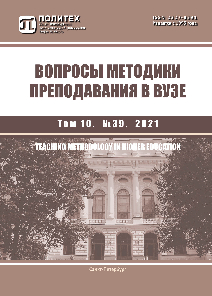Practice of applying psychological and pedagogical principles of active learning
The main requirement for higher education teachers over the past decades has been the transition to subject-subject relationships in the educational process. This requirement meets the needs of society, the innovative economy, the state and employers who need young personnel having not only a set of knowledge, but also a complex of soft competences, to become initiative, creative specialists. The transition to subject-subject relationships requires the teacher to use active pedagogy technologies, in particular, active learning methods (ALM). However, the implementation of these methods, as research shows, is hampered, first of all, by the reluctance or inability of university teaching staff. Another difficulty is poor elaboration of practically significant approaches and principles for developing active-type classes. The purpose of the research was to develop a scientifically based list of principles of active learning with a practical orientation. The study included the survey of the beginning teachers, an analysis of the guidelines they developed for conducting classes using ALM, as well as the results of defending the works prepared by them. As a result, a number of ideas were identified that were formed in the pedagogical environment as a result of the global dominance of the subject-object approach to learning for several centuries. This made it possible to formulate the principles of active learning with a practical orientation, which can be considered as support in the development of classes using active learning methods and, in general, practice-oriented classes.



